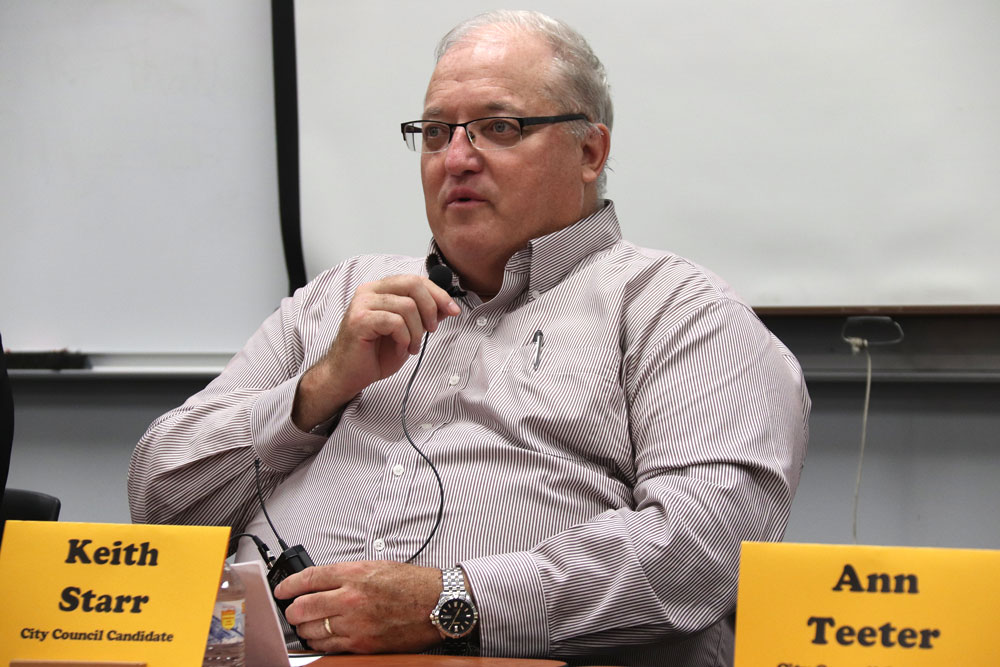State turmoil hits home for Medicaid patient
Service cuts are ‘devastating’
By Kate Hayden, khayden@charlescitypress.com
Michelle Waidler cannot keep up with her basic housekeeping needs. Her hands shake, she cannot prepare meals, she can’t walk to the bathroom alone.
For eight months, Waidler, 73, spent six hours a day with in-home health aids, funded by Medicaid. They helped her with basic care, chores and appointments outside of Waidler’s Charles City apartment.
Then in July, AmeriHealth Caritas — a managed care organization overseeing Waidler’s Medicaid case — sent notice that Waidler’s care hours would be cut from 180 hours a month to 64 hours.
Four months later, AmeriHealth Caritas announced the business would withdraw from the private care management of Medicaid, leaving approximately 200,000 Iowans who had been receiving Medicaid services through the private company.
“What AmeriHealth has done to me with this substantial reduction of everything, is put my health in jeopardy,” Waidler said. “It’s essential that we all go to the bathroom and we eat. Without these hours, I’m not able to do that.”
A SECOND LOOK
Iowa’s privatized Medicaid system was immediately off to a controversial start in 2015, when AmeriHealth Caritas was one of three managed care organizations (MCOs) announced by former Gov. Terry Branstad that would take over operations of the formerly state-run program.
At the time, Waidler, who was living in Butler County, was already one of thousands of Iowans relying on the $4.2 billion Medicaid program.
In November 2016, the Iowa Department of Human Services approved Waidler, now living in a senior apartment complex in Charles City, for an elderly waiver with 180 hours per month of in-home assistance, Waidler said.
Her aids assisted with everything she needs: bathing, food, grocery shopping, transportation and some needed correspondence. DHS also provided Waidler with a food stipend at the time.
Eight months later, in July 2017, Waidler received a letter from AmeriHealth Caritas announcing her elderly waiver was dropped, reducing in-home service hours to 64 hours a month.
In correspondence, AmeriHealth Caritas told Waidler her Medicaid benefit was capped at $1,365 a month, which her waiver was exceeding.
Waidler applied for an appeal of the decision and began writing letters to Rep. Todd Prichard, D-Charles City; Sen. Amanda Ragan, D-Mason City; Gov. Kim Reynolds; U.S. Sens. Chuck Grassley and Joni Ernst; a Des Moines ombudsman; and others.
“Obviously back in November, when I was first eligible for the 180 hours, someone saw that there was a need there. My need continues,” Waidler said.
The cut by AmeriHealth Caritas could eventually force Waidler from her home and into a more expensive skilled care facility, said Prichard.
“Initially (DHS) made a decision that it was a better use of resources to waiver her cap,” Prichard said. “They were saying, ‘All right, she doesn’t need skilled care but she needs a higher level of in-home (service).’ It’s cheaper, it’s more efficient as opposed to pushing her into skilled care.
“This is going to force Michelle to use all of her own money until she’s out of money,” Prichard added. “This is the worst nightmare from this privatization.
“The state needs to oversee this,” the area legislator said. “We need to put the state back as the administrator over these programs, not a private company.”
After her initial request for a repeal was denied, Waidler submitted an appeal for a hearing on Sept. 7. On Sept. 12, she had already run out of Medicaid in-home service hours for the month, and she wouldn’t have a hearing from DHS until Oct. 16.
“It doesn’t take very long for the money to run out when you’re paying well over $100 a day,” Waidler said.
TALK ACROSS THE STATE
Sen. Amanda Ragan, D-Mason City, hears from a lot of Iowans as a member of the Senate’s Health and Human Services Committee — from Medicaid patients and from care providers who may not be reimbursed for their work.
“There is so much change, and there is still concern about providers getting their payments,” Ragan said.
Providers told Ragan they were struggling to receive prior authorizations from MCOs for care services, she said, and had to learn the application and payment filing process for each MCO.
Medicaid cases under appeal by MCOs also delay payment to care providers.
“That’s going to impact all of us as well,” Ragan said. “If they’re not getting their Medicaid payments … their bottom line is being impacted.
“All of those [factors] are important, and each of them have a little different complexity,” Ragan said. “We have a lot of individuals on this service.”
Ragan said her office began receiving comments from Medicaid patients before MCOs took over management of Iowa’s Medicaid in April 2016, and had particular questions about how MCOs would manage the severely disabled population of Iowans requiring long-term services and support (LTSS).
She and other legislators asked the Republican majority to consider leaving those Iowans out of the Medicaid management pool, so their services wouldn’t be impacted by a for-profit company’s decision.
“If you’re going to do this, let’s not put the LTSS population in,” Ragan said. “We were getting good services. … I have not seen those improve for people, but I have heard people say they are seeing reductions.
“We’re all just one accident away from being somebody like this. You can fall down the steps, you can be in a car accident, there are a million different ways that that can happen,” she said. “It shouldn’t be this difficult for vulnerable Iowans. … It touches a lot of lives. I have great concerns about how this has been and will continue to be implemented.”
ANNOUNCING AN EXIT
AmeriHealth Caritas, the MCO managing Waidler’s case, announced the company would be withdrawing from Iowa’s Medicaid management program at the end of October over failed negotiations with the state for a new contract. The exit takes effect on Nov. 30.
AmeriHealth Caritas and the two other MCOs, UnitedHealthcare and Amerigroup, have publicly stated the businesses are losing money. Following news of the AmeriHealth Caritas exit, DHS announced the business planned to permanently lay off 400 employees.
Matt Highland, interim public officer for DHS, told the Press in early November that Medicaid patients would be reassigned to one of the two remaining MCOs to prevent coverage gaps for patients.
The department is searching for a new company to join Iowa’s Medicaid program effective July 1, 2018, he added.
“We’re focused on making sure they’re informed, there’s no gap in coverage and they will have a new MCO at Dec. 1,” Highland said. “They continue to have their coverage.”
By Nov. 21, Amerigroup announced it could not add any new Medicaid patients to its program, the Associated Press reported. In a statement, DHS said the state has received federal approval to temporarily suspend patient choice of MCOs, and UnitedHealthcare will accept about 215,000 former AmeriHealth Caritas patients for coverage.
“In the future, members again will have a choice in MCOs and will be notified when that choice is available,” DHS said in the statement.
News of the AmeriHealth Caritas layoffs came the same day Highland announced that the state will spend an additional $60 million this budget year for Amerigroup and UnitedHealthcare. The federal government will pay about $80 million more, totaling $140.4 million in additional spending for this budget year, the AP reported.
“This is a small increase when you compare it to national trends on health care spending,” DHS Director Jerry Foxhoven said in a statement.
ONGOING WAIT
With Prichard’s assistance handling the phone, Waidler participated in a case hearing that ran two and a half hours on Oct. 16, and was told a decision would take up to 30 days.
By late October, Waidler said, she was almost out of money. Another waiver program to increase Waidler’s service hours is pending, but that program would only add up to 23 additional hours per month.
“Even if I qualify for that program, that doesn’t nearly bring me back to what my former service hours were,” Waidler said.
Without a decision, it is unclear what options remain for Waidler.
“It’s not working for the state, it’s not working for the people that provide the medical services,” Prichard said. “It’s not working for the clients, the recipients. It’s simply not working, and now it’s not working for the MCOs.
“I really think it was so foolhardy to ditch the system in favor of a privatized system, in such a short timeframe,” he added. “There’s something wrong when nobody wants to provide services or do business. When they don’t want to provide medical insurance or services to Iowa, there’s something wrong with our system.”
“This could happen to anyone, through no fault of their own,” Waidler said. “In all probability if it affects you, you need to try to remedy the situation. But that’s not always an easy task.”









Social Share